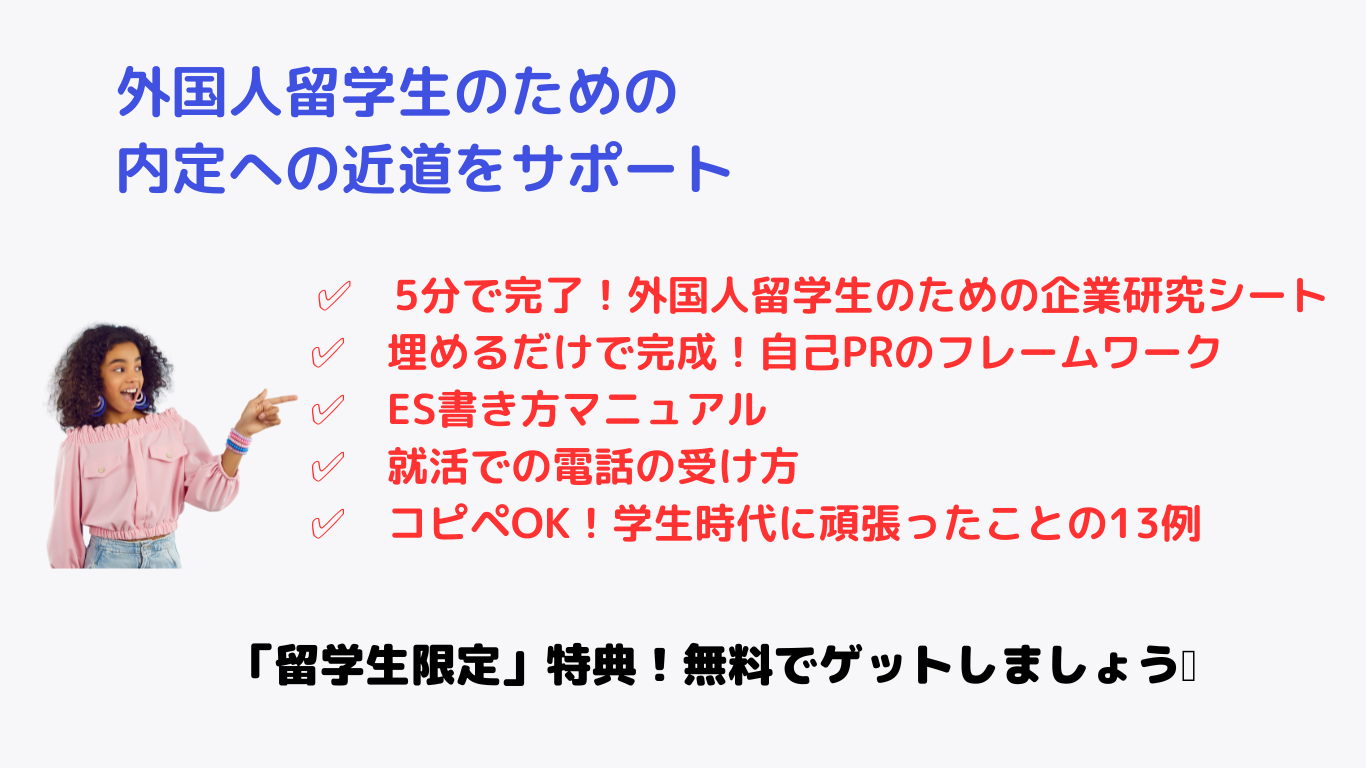Why You Are Asked About ‘Reasons for Studying Abroad in Japan
Reason 1: Understanding the Purpose of Studying Abroad in Japan
One of the primary reasons for asking about your “Reasons for Studying Abroad in Japan” during interviews is to gain insight into your study objectives.
Many international students might mention various reasons such as “being a fan of anime,” “liking Japanese culture,” or “studying Japanese language at university.”
However, the interviewers are not primarily interested in why you personally like Japan; rather, they want to understand “what specific goals led you to pursue studies in Japan.”
For instance, convey the purpose of your study abroad by stating something like, “〇〇分野で〇〇を学ぶために、日本に留学しました.”

Reason 2: Assessing Potential for Goal Achievement
The second reason for inquiring about your “Reasons for Studying Abroad in Japan” during interviews is to assess whether you possess the capability to achieve your goals.
Through asking about your reasons for studying in Japan, interviewers aim to not only understand your study objectives but also to ascertain whether you have successfully achieved those objectives.
Furthermore, in the context of future employment, they are evaluating whether you are the kind of individual who actively works towards accomplishing set goals.
Hence, it is important to convey both your study goals and the “actions taken to achieve those goals.
Key Points for Responding to Reasons for Studying Abroad in Japan:
Response Point 1: Conveying Study Goals
One of the primary points in answering the question about “Reasons for Studying Abroad in Japan” is to communicate the study objectives.
When asked about your reasons for studying in Japan during an interview, begin by explaining “what specific goals led you to pursue studies abroad.”
Clearly convey to the interviewer that you embarked on your study journey with well-defined objectives.
Response Point 2: Explaining Why You Chose Japan as Your Study Destination
The second key point in answering the question about “Reasons for Studying Abroad in Japan” is to explain “why you chose Japan as your study destination.”
In order to achieve your study goals, clarify why you opted for Japan instead of other countries.
For instance, convey the reasons for selecting Japan as your study destination, such as “I chose to study in Japan because the field of △△ is highly developed here.”
This will help the interviewer understand the rationale behind your choice to study in Japan.
Response Point 3: Describing What You Learned from Studying in Japan
The third key point in answering the question about “Reasons for Studying Abroad in Japan” is to discuss what you have learned from studying in Japan.
As study abroad experiences themselves might not be highly valued during job hunting, it’s important to highlight what you have learned specifically from studying in Japan.
Explain the skills and knowledge you acquired as a result of achieving your study goals.
This will showcase the practical benefits of your study abroad experience and demonstrate your growth during your time in Japan.

Response Point 4: Conveying How You Intend to Apply What You’ve Learned
The fourth key point in answering the question about “Reasons for Studying Abroad in Japan” is to explain how you plan to apply the knowledge and skills gained from your study abroad experience.
By describing how you can utilize your study abroad experience within the desired company, you effectively communicate your strengths to the potential employer.
Linking what you’ve learned from studying in Japan to the responsibilities of the prospective role demonstrates your enthusiasm and determination to contribute effectively after joining the company.
Examples of ‘Reasons for Studying Abroad in Japan
事例①:専門知識を学ぶため
〇〇学の知識を身につける為に、留学することにしました。大学で〇〇学を勉強していましたので、海外の視点から〇〇学を学び、より深い素養を付けたいと思いました。日本では、母国の学校でなかなか受けられないコースを受講できるし、世界で日本の〇〇分野の研究が注目されているので、日本に留学しました。
また、〇〇大学〇〇学で〇〇について勉強することで、〇〇の知識を身につけることができました。
留学経験で身につけた専門知識を活かして、貴社の〇〇商品の開発に携わりたいと考えております。
事例②:日本語を学ぶため
ビジネスレベルの日本語を勉強し、日本語を使って仕事をする為に、留学することにしました。また、日本語だけではなく、日本の文化や考え方も身につけるために、来日しました。
〇〇大学外国語学部で日本語を専攻し、日本語の「音声・音韻」や「語彙」、「文法」、日本語の歴史を学んでいます。また、アルバイト先や学校生活などで日本語を使ってコミュニケーションを取っています。
私の強みである日本語や英語、中国語を活かして、貴社で営業職として日本や海外の顧客と取引を担当したいと考えています。
Bad Reasons for Studying Abroad
Bad Reason Example 1: Because I Like Japanese Culture
One of the inappropriate reasons for studying abroad is stating, ‘Because I like Japanese culture.’
Interviewers are not concerned with whether the student likes Japan or not.
Preferring Japan as a destination is insufficient as a justification for studying abroad.
Rather than simply expressing a personal preference, it is important to communicate specific goals and purposes for studying abroad during job hunting.
Bad Reason Example 2: Just Wanted to Go Abroad for Some Reason
Another inappropriate reason for studying abroad is stating, ‘I just wanted to go abroad for some reason.’
This kind of response does not constitute a valid reason for studying in Japan.
If you lack a clear purpose for your study abroad experience, interviewers might conclude that you are unable to take action with defined goals.
When asked about your reasons for studying abroad in an interview, avoid providing vague answers like ‘I just wanted to study abroad for some reason
Bad Reason Example 3: Encouraged by Friends or Family
Another inappropriate reason for studying abroad is stating, ‘I studied abroad in Japan because I was encouraged by friends or family.’
This kind of reason is not considered favorable during an interview.
Explaining that you studied abroad solely based on the advice of friends or family might portray you as lacking initiative.
Avoid presenting study abroad reasons that give the impression of passivity to the interviewers.


